On turning 30 / Of being like me
It is evident you love me. Perhaps you want me; perhaps you want to be like me. Either way, I've got you covered with this guide on how to live.
There is nothing I would claim expertise in. One of my biggest strengths is approaching subjects like a beginner. I can then see the modes of thinking that already exist about it, and try to say something that blends a little bit of me with a little bit of everything that’s already out there. This is how “new” things are made, I think. It is how I think, anyway.
Lately, I have also started to feel.
At first, I did not feel anything about turning 30, which I did at 6.19 am on 8 April 2023. Six months before the moment, though, people started alerting me to this fast-approaching “milestone”.
“So! Thirty! How do you feel?”
“What plans for the decade?”
“Come on, you must feel something?”
I realized I did. I have been living life like a Beginner, and now I feel in between Beginner and Intermediate, which is really a regression to Beginner if you’re Doing it Right.
Without further ado, I want to tell you how to turn 30 / be like me.
Surrender to life. This does not mean you have to relinquish control over the parts of life you can control, like your actions and reactions, but, instead, it means properly accepting what you cannot control. They say wisdom lies in knowing the difference. No, you must admit, you cannot go back in time and deliver that perfect insult—nor can you take it back. So you must accept situations and people as they are, influencing outcomes only through suggestion or real work, instead of fighting, doing the same thing over and over, or caring to a fault. It means seeing your successes and failures both, instead of pretending they don’t exist, which would create neuroses that unconsciously dictate your circumstances. Prevent that by being real. Surrendering to life, then, means operating from a place of truth: doing your best with whatever is thrown at you, while also trying to ensure that what gets thrown at you is desirable. You may find you control a great deal in life.
It is okay to not be a Party Animal. Especially if you have spent your twenties chasing adventure, it may be hard to accept that your life cannot be a collection of its most exciting moments. You cannot keep doing new things; you cannot keep living on the edge. We must accept this. Any real contribution to society, or even just good health, comes from rote methodical existence. You must sacrifice hangovers for sunshine and timely breakfasts. Even the odd night out can be immensely destabilizing. I was reminded of this on my 30th birthday, which is when I was supposed to write and share this, but here I am, a little late. It’s excusable, I suppose, but it is also okay to not be a Party Animal.
Laugh about everything, especially whatever hurts the most. I have found this really helpful. Some say it is an unhealthy coping mechanism. But if you are really funny, you are probably really laughing. Knowing what hurts and joking about it requires self-awareness and an ironic approach to life. You are aware of the bad feelings but are not overcome by them, instead living with them openly, thereby reducing the power even the worst has over you. But if you keep joking about what hurts, not knowing when to stop or how the audience is getting uncomfortable, you may need help.
Be active on LinkedIn: There is no superiority in not being active on LinkedIn. There is even less in shitting on LinkedIn on Twitter. Everyone is being cringe in their own way. If you are cringing at how others are being cringe, you are caught up in the shame of cringe overall, which means you are not above judging yourself. Get over yourself. A good way to do so is by being active on LinkedIn.
Inspire and be inspired by women: I sometimes think of my mother when I post on LinkedIn, because we’ve both seen how much our professional achievements—and our very freedom—elicited from us. Most of the women I know have fought hard to be where they are. It is thus naturaI that I become very happy whenever a woman has something positive to take away from me. Some of the nicest things that were ever said to me were said by women. A few examples:
Kalpana didi, who comes to my house at 9 am daily to clean and cook two meals, told me on my 30th birthday: “Aap ka life kitna accha hai didi, shaadi nahi kiya hai, do bacche nahi hai meri tarah, aap sundar ho, aise hi ghumo firo,” she said. (“Your life is so good sister, you aren’t married, you don’t have two kids like me, you are pretty, keep having fun.”) I really appreciated this from her, especially because she doesn’t even know about the battles on my way to this lifestyle. She just gets it.
I particularly love this thing my friend Akshita wrote about me after we spent a summer together working for a fine and popular Indian narrative non-fiction magazine.
c. This one just… to be looked at and read so deeply—thank you.
There’s more like this—long-form letters to a long-form writer—but I’ll save it for a long-form essay. This one is in another style, closer to the traditional variety of the format; you know, the ones that are the author’s musings on a single subject, titled something like “On _______” or “Of _______”, and it’ll be some 2000 words on death or of travel.
A reminder: this one is On turning 30 / Of being like me.
I think it is important to note repeatedly that a woman can be free and all-creative, somehow unmarred by the kind of insecurity that can rule the waking male life, because we can be integrated in our pursuits, aggressive and loving, strong and gentle, emotional and intelligent.
I am inspired by women who fully wear their womanhood, sometimes by defying notions of femininity, sometimes by playing by them exceptionally, usually doing both together while being extremely funny. I’d like to share some topical scenes from Seinfeld, in which Elaine is particularly striking about femininity and grace. It resonated with me because women are expected to become more graceful with age, as though they’re chandelier. But take Elaine in a potential job situation: she goes from abandoning her little semblance of grace because a female employer insists on it, to goofing around with a man who sees “some” grace in her. The funny thing is that she’s being quite graceless throughout, like a woman on a mission with no plan. I think I am—or want to be—like that. My female heroes are extremely competent (in real life, and maybe on screen too) but quite graceless.
Like them, I have some grace.
Be intelligent. Intelligence is worth cultivating. It is inseparable from study, from being a beginner, from operating from a place of truth, from being willing to change and do what it takes to be happy, from having a roof over your head and three meals to eat daily. Unfortunately, a patriarchial society can seem to put intelligence and femininity in opposition: you cannot be extremely smart if you’re also emotional (the underlying presumptions being that emotionality is not intelligence, and that emotionality is feminine, both of which should be challenged); you are smart only if you’re good at maths (maths, science, and masculinity are idea with colonial legacies in India); etc. etc.—don’t even get me started on how self-deprecation can be mistaken for genuine underconfidence when coming from a woman. What a blow it feels like when that happens. Brings me to my knees.
Feign a sense of destiny. Make everything seem fated. It will make people love and respect you. If someone sends you a Reel, tell them you were just going to share the exact same Reel with them. If what you want for lunch is being served at a joint you happen to be walking past, it means you’re special.
Do not care what other people think. The moment you care what they think, they will think less of you, so if you want them to think highly of you, do not care what they think. Furthermore, whatever you think they think of you is colored by what you think of yourself, so it is best to work on feeling good about yourself first. Once you do that, you will not care what other people think. A good book to read is What Do You Care What Other People Think? by Richard Feynman. I haven’t read it yet, but I’m sure I’ll love it.
Be disciplined and fun. What I mean is: try and have a healthy lifestyle, some hobbies, something to care about that keeps you going always. It is half the work of good mental health. Exercise six days a week, or at least four. I have gone from six to four over the last two years.
Aim for liberation. I was shocked to find out what nirvana really is. It isn’t some mere state of peace and calm. It is the end of the game of life. Do you want to keep playing, going up and down the highs and lows of the winding Gordian knot that is your life, your fate, your circumstances? Or do you want to realize it is all fleeting, all endless, and that real truth lies in a Oneness that the knot is a fractal of? According to GPT-4, “aiming for liberation can provide numerous benefits, including freedom from suffering, inner peace, personal growth, spiritual fulfillment, increased empathy and compassion, and greater mindfulness. By seeking liberation, individuals can lead more meaningful, fulfilling lives and contribute positively to the world around them.”
Wear makeup. I can’t overstate the benefits of makeup, and, largely, dressing well. I don’t mean fancy clothes so much as the act of adorning oneself. It can be restorative, especially to an unmoored self. (To be clear, makeup or makeup-masquerading-as-skincare have not been good for my skin, but these tools also mitigate their own side effects, which really helps.)
Embrace contradictions. Contradictions occur when one construct you have created violates another construct you have created using the same set of rules or operations. They occur when the set of rules and operations are insufficient to explain what you’re trying to explain with it. Thus, recognize the fallibility of constructs and the rules they’re derived from. Apply logic, note the inconsistencies it throws up, and remember that that too is expected and logical, because reality is not logical.
Listen to music no matter what you’re doing. It prevents boredom. It can improve concentration.
Dance like everyone is watching. Everyone is watching, so you might as well dance like it.
Do not apply to Forbes 30 Under 30. Although I have exhorted you to be active on LinkedIn, I do not recommend Forbes 30 Under 30.
You love your parents. Early adulthood may be marked by resentment for the people who gave birth to us, because life may have been lived under their thumb, directly or otherwise, knowingly or unknowingly. But as you heal, you realize they were alright. Your parents made it possible for you to exist, to heal, and your love for them is real and deep, whenever you get over your shit. This takes real work. I know Indians are the last people who need to be told to revere their parents; we hear enough of it already, and following it blindly can keep us from becoming full persons. But now that I have worked on my shit a bit, I will introduce a Buddhist idea: that it may take lifetimes to repay the debt of gratitude we owe our parents.
Say nice things to people. It is best if you mean it too. The biggest measure of a life well-lived is in the quality of its relationships. I’m trying to be better at mine. Humanity can be compared to an ant or a bee colony, in that we are all interconnected with every other being, each doing their part for the larger good. And the currency of doing things in the human colony is love: we do everything to give and receive love.
Use yellow lighting liberally. It makes every space look better while being suited to multiple moods and functions: you can work, read, watch TV, party, workout—all with yellow light. I only use white light in critical, austere situations, such as when I’m looking for something lost, or when I’m late to the airport and hurriedly packing.
My biggest life lesson is that you do not have to think of 30 things to say just because you have turned 30. Life is not an algorithm—not a simple one, at any rate—unlike the platforms you’re trying to sell your life to.
Cheers,
Until next time,
This screengrab from Kabhi Khushi Kabhi Gham is basically my entire advice:
“If you want to be something in life, to earn something, to win something, then always listen to your heart… and if your heart doesn’t give you an answer, then close your eyes and remember your mother and father… then, you’ll see, all your destinations will be crossed, all your difficulties eased… victory will be yours, only yours.”









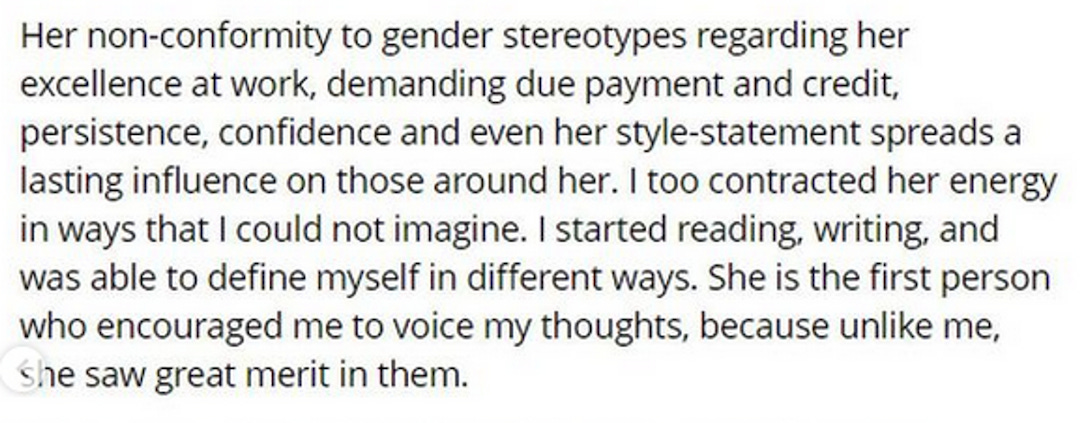
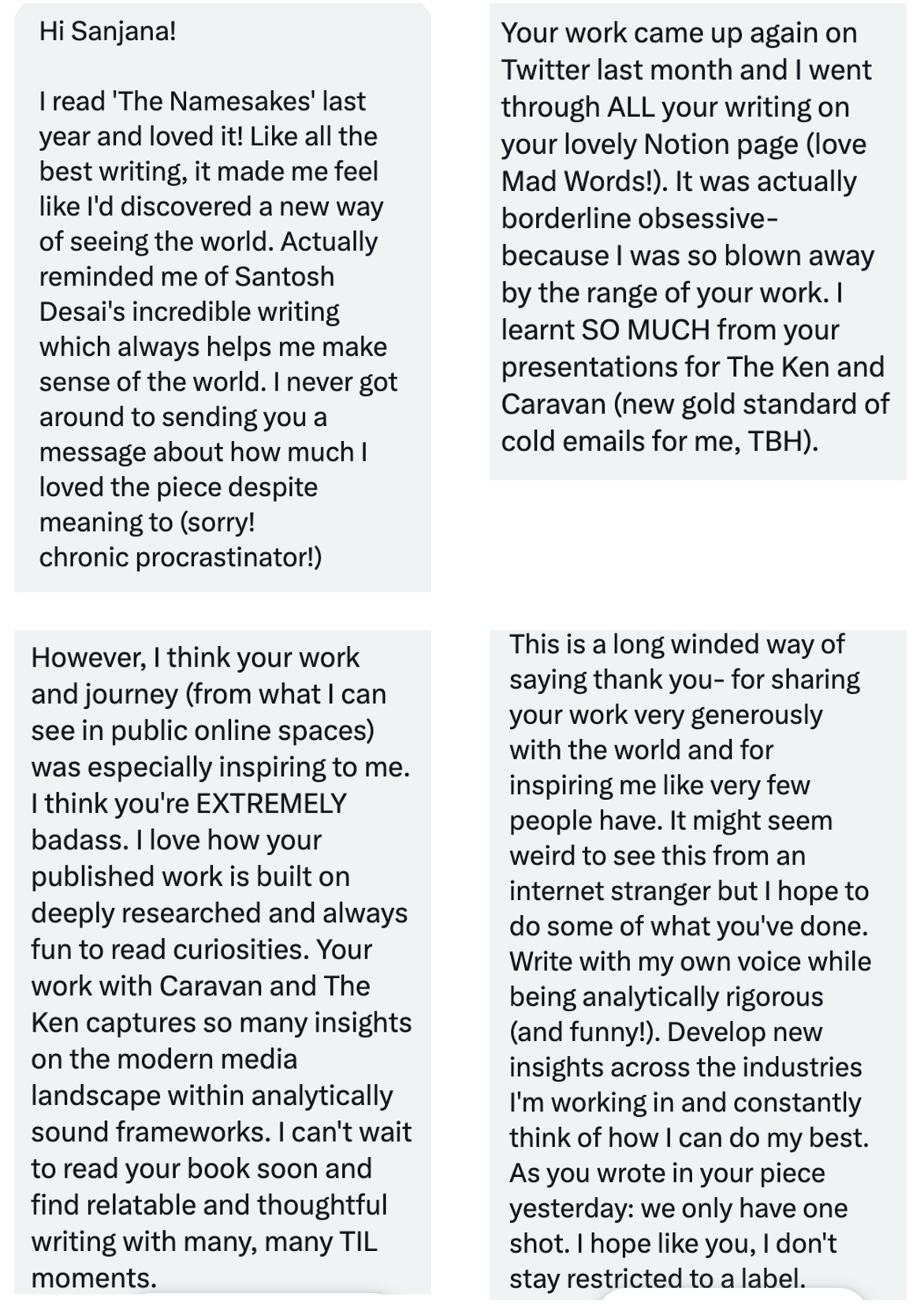
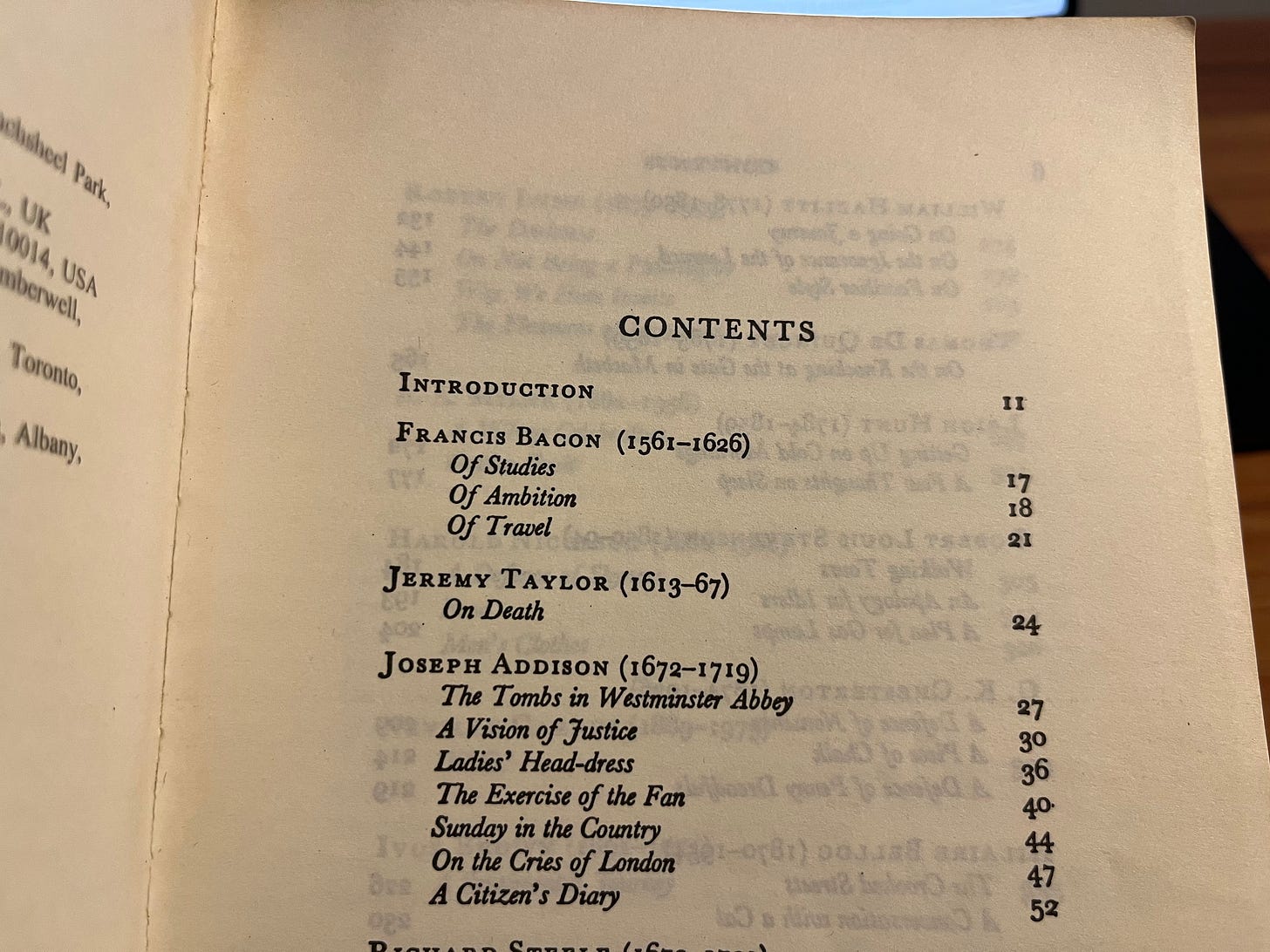
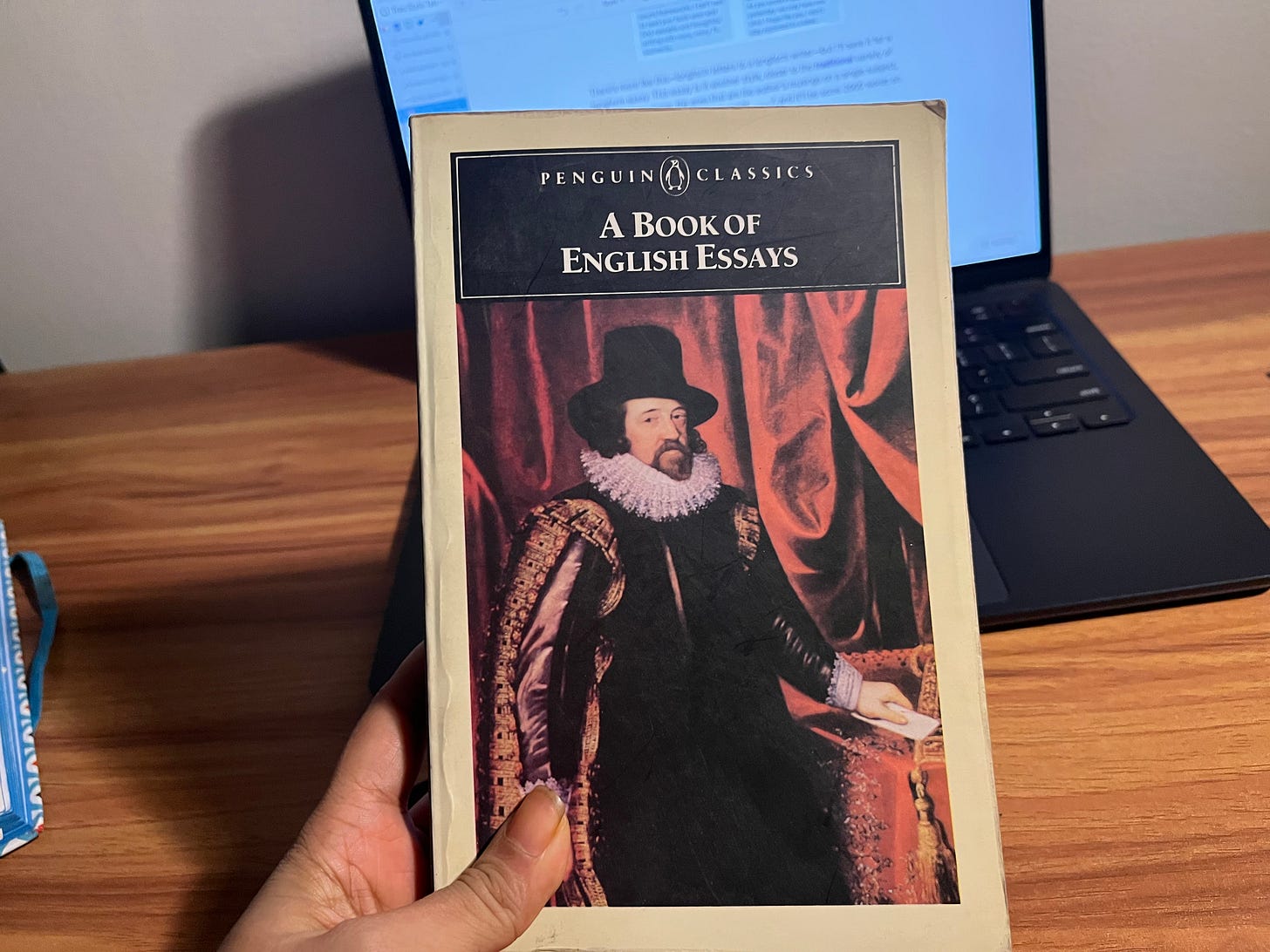
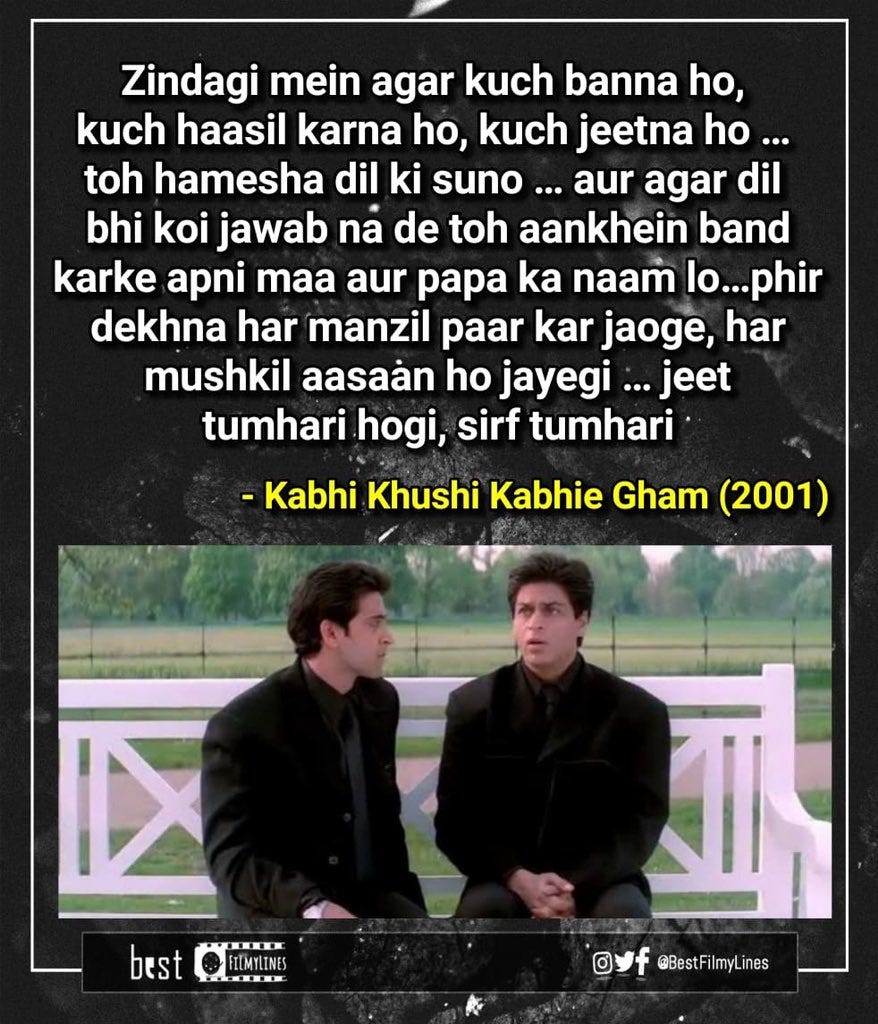
A brilliant and resonant essay Sanjana. Thank you so much for the wisdom of your words.
Belated Happy Birthday to You, Sanjana 💐.